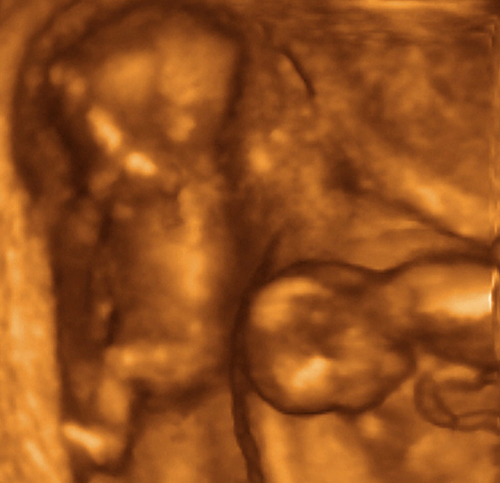You are 16 Weeks and 2 Days 166 days to go…
Your baby is at his most mobile about now, and he may even be doing somersaults in your uterus.
Your baby today
In this color 2D ultrasound scan the baby is facing upward. The
skull bones reflect the ultrasound beam most effectively and show as
bright areas. The curved frontal bone of the forehead is seen just above
the short nasal bone forming the bridge of the nose.

There are several ways in which your baby
can now move: he can curl and stretch his trunk, move his head up and
down and from side to side, and move his arms and legs independently.
Regular chest wall breathing movements occur, along with occasional
hiccups. The mouth can open and shut, and your baby can yawn and swallow
amniotic fluid. He’ll bring his hands up to the face and prefer lying
on his side rather than back. He has plenty of space in which to move.
Your baby’s taste
buds first appeared at 10 weeks and by now have an appearance very close
to that of a mature taste bud. They also have their own nerve supply,
connected to a branch of the facial nerve. Because these neural
connections have not yet matured, it is too early for your baby to be
able to taste anything.
… Doctor
| Q: |
What is DVT and am I at increased risk of it when I fly?
|
| A: |
DVT stands for deep vein thrombosis, a condition in which a
blood clot forms in a deep leg vein. DVT partially or completely blocks
the blood flow in the vein, causing pain and discomfort. The most
serious form of DVT is a pulmonary embolism, when part of the clot
breaks off and travels to the lungs, blocking a pulmonary artery. This
can cause chest pain, shortness of breath, and blood-tinged phlegm to be
coughed up. In severe cases, a pulmonary embolism can be fatal.
Pregnancy is considered
to be a thrombotic condition, meaning it can lead to clots forming in
blood vessels, so you are at increased risk of DVT even when you’re not
traveling by plane. Women who have previously had DVT or who are obese
are more at risk of getting the condition.
Wearing support stockings,
drinking plenty of fluids, and moving around while flying can help
prevent DVT. If you’ve had blood-clotting issues in the past, avoid
flying at all during pregnancy.
|
… Twins
How your babies interact
By now, you may be starting to feel your twin babies move.
Contact between them probably began a few weeks ago, long before you
knew about it, and it becomes more complex as their brains develop. By
this stage of pregnancy, a baby has the elementary brain circuits that
help him feel the parts of his body and appreciate their position, so
it’s no wonder that your babies can now interact at a basic level.
Your babies will
move around 50 times an hour and can touch each other, even though in
all but a tiny percentage of cases they’re in separate amniotic sacs so
there’s a membrane between them. Ultrasound studies show that twin
babies make physical contact and sometimes react to each other’s touch
and pressure.

You are 16 Weeks and 3 Days 165 days to go…
While you’re pregnant, it’s even more important to find ways to relieve stress and keep any worries in perspective.
Your baby today
This 3D scan is taken from a viewpoint above the baby’s head and
looking over the shoulder, but since the baby is curled up the face
cannot be seen. The placenta is to the right of the image, with the
umbilical cord over the baby’s arm.

You may be pregnant and happy,
but life goes on: you might still be working full time, as well as
running a home, and you’re bound to have stressful days and times when
you feel you can’t cope. And, of course, you’re still contending with
those challenging pregnancy hormones that can cause some emotional ups
and downs.
Like many women, you
may become stressed about the big changes that are going to happen, and
worry about factors such as finances, whether you’ll be a good mother,
and how your relationship will change. It’s important to keep worries in
perspective and maintain an emotional balance because being stressed
isn’t good for your health or that of your baby.
Find ways to destress (see Relieving stress), as well as talking to others—your partner, friends, and doctor—about any concerns.
Relieving stress
Learn to recognize the signs that you’re stressed: you may feel your heart racing or a rise in your body temperature. When you know you’re stressed, take action.

Identify the cause
and try to keep it in perspective. Let go of the stress by breathing
deeply and relaxing your muscles. Imagine blowing the stress away as you
exhale.
Stay busy—sometimes having too much time to think can make you more stressed.
Go swimming: it’s a great stress reliever and a fantastic way to stay in shape, too.
Take time to relax,
especially if you have a lot on your mind or are juggling lots of
things. Put your feet up, watch TV, read a book, or think about your
growing baby.
Talk through your problems
with your partner or a close friend. If you’re worrying about any
aspect of your health or how your baby is developing, seek reassurance
from your doctor.
If work is an issue,
be honest with your boss or the human resources department and they may
be able to help. Your most important job right now is to nurture your
baby.
A mother’s stress can be transmitted to the fetus.
The level of the
stress hormone cortisol in the amniotic fluid matches that in the
mother’s blood. Cortisol is thought to adversely affect fetal
development.